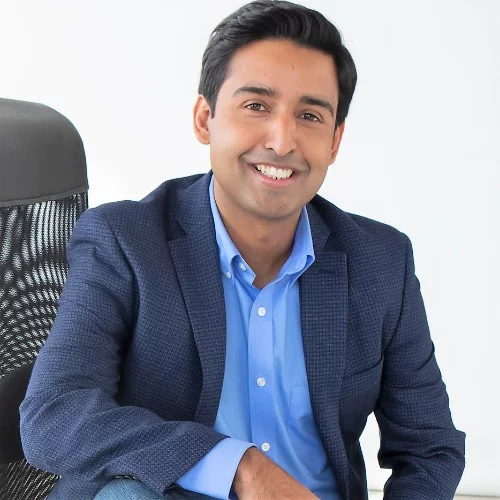Ahead of the IBM CDO Summit on May 1-2 in San Francisco, we have been holding a series of interviews with some of the leading Chief Data Officers and Chief Analytics Officers who will be speaking at the exclusive, free-to-attend event. In our latest interview, Corinium’s Chief Data Officer Community Director, James Bowater, sat down with Asim Tewary, Head of Enterprise Data Science & Advanced Analytics at Verizon. They discussed how Artificial Intelligence and Machine Learning can impact your business, and the crucial steps to fully utilizing these technologies for success.
At Verizon Asim drives revenue growth, churn mitigation, digital transformation, and data monetization for $120 Billion business across Wireless, FIOS, IoT, and enterprise businesses across 130+ Million customer base. His current focus is building cognitive self-learning capabilities to augment employee intelligence (digital employee) and personalize customer experience across channel using customer DNA and propensities derived by deep learning algorithms. His responsibilities extend across all aspects of Data Investment, Management, and Monetization including Budgeting, Infrastructure & Operations, Governance, Business Intelligence, Data Science & Advanced Analytics, and End-to-End Solutions Design & Implementation.
Prior to joining Verizon, Asim was Managing Director for PwC’s Financial Services Analytics practice across banking, capital markets, insurance, risk, and asset management business and Chief Data Officer at AIG. He has over 20 years of experience and has held senior leadership positions managing analytics organizations at Morgan Stanley, Bank of America and other financial services companies.
James Bowater: At the upcoming IMB CDO Summit, you’ll be speaking in the keynote panel on Succeeding in the Cognitive Age: Exploiting the Potential of Artificial Intelligence and Beyond. What do you think a cognitive enterprise looks like in practice and what are the steps to becoming one?
Asim Tewary: A cognitive enterprise should have AI & ML embedded in the fabric of every decision made by the business across business operations, sales, marketing and other functions. Optimizing business process and enhancing customer experience are opportunities for AI/ML to make a huge impact. AI/ML driven insights and models will not create business value unless operationalized. Hence developing a culture of AI/ML and designing business processes and customer experiences informed by insights is critical.
What are the steps to becoming one? Steps to becoming a cognitive enterprise require evolving from descriptive and predictive (looking back) to prescriptive and adaptive (self learning). Data is the fuel for algorithms. So building robust platform and data layer with advanced feature engineering is important. Outcome driven approach with business value creation is the best approach instead of boiling the ocean.
James Bowater: AI and machine learning are very fashionable at the moment. There’s lots of hype surrounding it. How mature do you think AI solutions currently are and are they at a point now where we can achieve that process of embedding artificial intelligence in every decision that a business makes?
Asim Tewary: AI is not new. AI has been around for over 50 years. AI spectrum includes rules based capability that has no learning capability to human like conversation capability that learns from interactions and improves over time. Nirvana for AI is passing the Turing test where we cannot distinguish human from machine. We are in early stages of AI with limited learning capability that is ready to augment human by automating tasks to create efficiency and scale, process massive amounts of data to predict intent and make customer interaction personal and contextual, and having a basic conversational dialogue. We are at a point where artificial intelligence can be embedded in the low to medium complexity decisions that business makes. We are far away from achieving the human like cognitive abilities.
James Bowater: You mentioned earlier using real time information, to go beyond looking at historical analytics and applying analytics to data that you have from the past, and using that real time information and driving insight from that. Are there any use cases that you’ve used at Verizon, employing real time insights and what have those been?
Asim Tewary: We have implemented a AI/ML solution in digital operations that ingests real time data across channels find patterns in customer journey’s using unsupervised learning, detecting friction points, and prescriptive treatment to personalize experience.
James Bowater: And in terms of the skill set require to better use of AI and to achieve all of these goals, it’s very much in demand right now and enterprises have to battle against that talent shortage to find the appropriate people that can empower that business to succeed. How have you gone about making sure that Verizon has the right mix of skills within your team to achieve the goals that you’ve set out?
Asim Tewary: That is a great questions because I think every industry, every company is dealing with a shortage of skills. In my mind, the most important skill is domain knowledge and understanding of the business process. Domain experts understand the business problem and keep data scientists grounded in reality. They also play the role of knowledge engineers who train AI/ML solutions. Second is data science. Data scientists are very hard to find requiring combination of engineering, statistical, and business experience. Third are the big data engineering to ensure highly scalable and real time platform to run hundreds of modes in real time.
James Bowater: Absolutely. One thing I’ve read about recently, actually, is the emergence of the idea of DataOps, which seems to be an emerging buzzword. By which I mean, trying to design and implement your architecture in a way that enables collaboration between data scientists and data engineers so that you can respond more agilely to whatever situation that comes up.
Asim Tewary: Yes, we don’t use the term DataOps however we have built a scalable real time architecture with semantic layer available for data scientists to build models at scale and collaborate with AI/ML community.
James Bowater: For my final question then, looking to the future, which technologies do you think will have the biggest impact on businesses in the coming years and what should companies be doing now to better prepare to exploit those?
Asim Tewary: I think RPA and chatbot enabled by cloud and data science automation tools will be key to future success. It is also important that we architect for interoperability across cloud and security.
James Bowater: Fantastic. Well, thank you very much for sharing your insights.
Be sure to check out our other speaker interviews and exclusive content and , and apply for your complimentary place at the IBM CDO Summit in San Francisco on May 1 – 2. The event is the must attend, invite-only gathering for 120+ CDOs, CAOs, and other senior data & analytics leaders. It is just 1.5 days long, free to attend for all who qualify, and open exclusively to senior executives. There are no sales pitches, and the focus is on genuine interaction and conversation with speakers and attendees, rather than slide decks. We hope to see you there!








